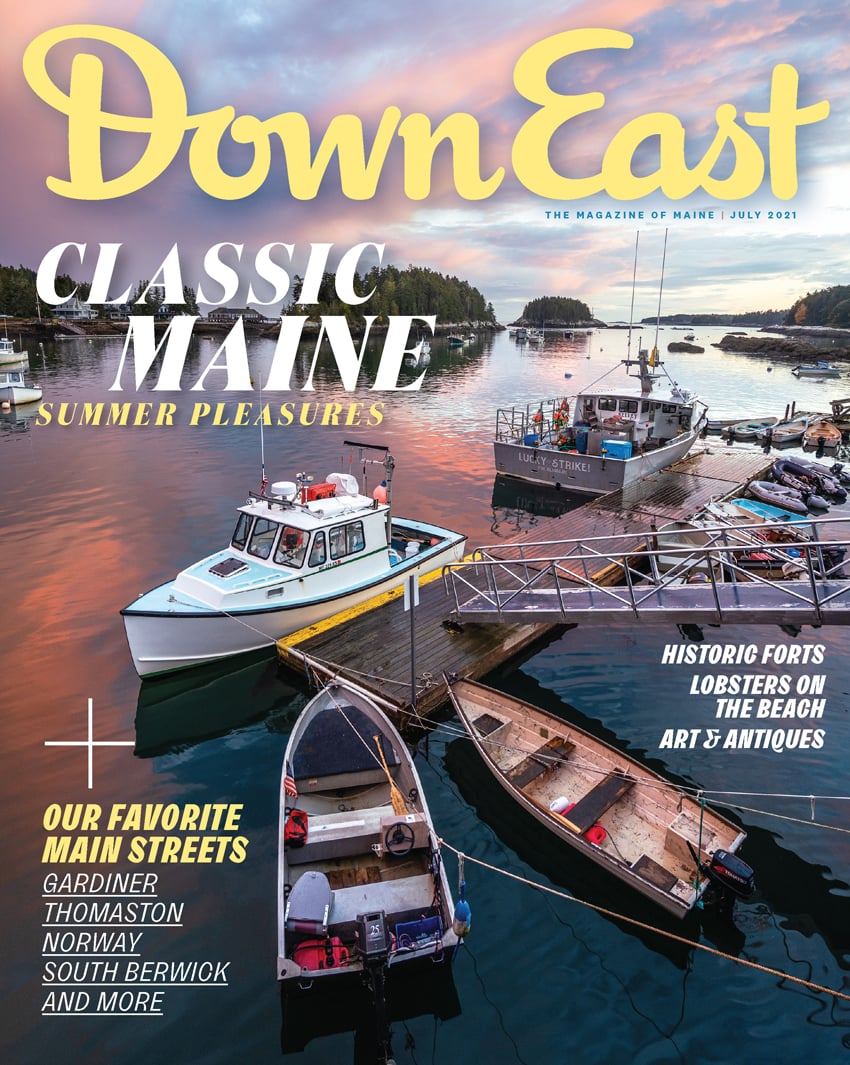By Brian Kevin and Will Grunewald
Photographed by Benjamin Williamson

Main Streets with moxie! In our July 2021 issue, we took a look at six of our favorite downtowns from all across the state — and the businesses, buildings, and boosters that make them great. Read up on more of Maine’s best small-town downtowns and start planning your next road trip.
Anti-Chain Gang




Clockwise from top left: Beale Street Barbeque chef/owner Michael Quigg; pulled pork on a bun, served with grilled jalapeño cornbread at Beale Street; peering through the windows of Bath Brewing Company; Jennifer DeChant opened the Bath Sweet Shoppe, on Centre Street, last year.
“When we came, there were really just two full-service restaurants downtown,” recalls Michael Quigg, who opened Beale Street Barbecue (215 Water St.; 207-442-9514) 25 years ago this spring. “Back then, everybody was working to keep the town from being consumed by big-box stores and corporate restaurants.” The efforts seem to have paid off, as downtown Bath is a veritable food court today, with a brewpub (Bath Brewing Company, 141 Front St.; 207-560-3389), a deli (Sisters Gourmet Deli, 45 Vine St.; 207-321-9443), top-notch Thai (Best Thai II, 23 Elm St.; 207-443-8655), steak and seafood (the venerable J.R. Maxwell & Co., 122 Front St.; 207-443-2014), a terrific bakery with pop-up Korean cuisine on Friday nights (Centre St. Bakery, 29 Centre St.; 207-389-4547), and a lot more.
Chains and big boxes never got the better of the City of Ships, where Front Street — alongside its newer restaurants, boutiques, and specialty shops — has hosted a furniture store for 125 years (now Country Farm Furniture Store, 148 Front St.; 207-443-2367), a drugstore for 106 years (Wilson’s Drug Store, 114 Front St.; 207-442-8786), and Renys for 48 years (86 Front St.; 207-443-6251), among other long-term occupants. Until recently, most rented from a single landlord, the Morse family, which owned 19 downtown buildings for generations, including the one housing Beale Street Barbecue. Quigg attributes much of downtown’s vitality to the Morses’ reasonable rents and conscientious curating of tenants. “I’ve always referred to them as stewards of the town,” he says.
He was one of a dozen or so business owners to buy their building in recent years, as the Morses liquidated their holdings. John G. Morse IV, who formally folded his family’s real estate company at the end of last year, says he and other family members were simply ready to move on or retire. Looking ahead, he doesn’t worry much about the big-box plazas or the strip malls. “If nobody local owns the shopping center, then there’s no loyalty there, whereas there’s loyalty to a downtown,” Morse says. “People understand there’s a sense of community there.”
Nightlife: Music City

Eat your heart out, Nashville. From late June through August, twice-weekly Gazebo Concerts in Library Park (free), at the north end of downtown, feature the Bath Swing Band on Tuesday nights and a summer lineup of concert bands, jazz bands, and string outfits on Friday nights. Also Fridays, mid-June through July, the Grant Lot Summer Outdoor Concert Series ($12) welcomes rock bands, singer-songwriters, and more, mostly touring groups from out of state. On Saturday evenings, the Waterfront Park Concert Series (free) brings blues, steel drums, a capella groups, zydeco, and more to a stage fronting the Kennebec River. And live bands are part of the mix during the Bath Art Hop, every third Friday in the parking lot next to City Hall.
Downtown Tour With The Charlies

In 1999, the city purchased the first Bath Trolley to link the city center with Maine Maritime Museum, 2 miles away. The museum was enjoying a surge in popularity, and business owners hoped charmingly old-timey transit might lure tourists their way. That trolley — named Emma, after native daughter and international opera singer Emma Eames — wasn’t Bath’s first. In the early 1900s, a 50-mile streetcar network shuttled workers and shoppers among Bath, Brunswick, Topsham, Lisbon, and Lewiston. Automobiles killed the trolleys, plus some liveliness in those towns.
Emma was really a dressed-up bus, running trackless on rubber tires, but she looked the part. So does the newer model that replaced her — Charlie, named for Charles Burgess, a Bath founding father. Another Charlie, Charlie Williams, has become something of a city ambassador during two decades of driving. Now in his 70s, Williams regales riders with local history. During the holidays, he sets an evening caroling route through neighborhoods with the best Christmas lights. What started as a tourism ploy has grown into a cheery symbol of civic pride, and lots of people pay the unchanged fare — $1 — just to take a loop with the Charlies.
One Sweet Landmark

Attendance has been dropping at churches nationwide — but not at the Chocolate Church. It helps, of course, if Grammy-nominated singer-songwriter Joan Osborne, local rockers the Mallett Brothers Band, or platinum-album pianist George Winston leads the congregation. In 1977, Bath’s old Central Congregational Church was reformed as the nonprofit Chocolate Church Arts Center (“chocolate” because of the deep-brown paint job) and became a cultural hub. Beyond the concert lineup, the center hosts plays — King Lear to Oklahoma! — and art exhibitions, with the gallery recently reopened after a pandemic pause. The 173-year-old Gothic Revival landmark is taking baby steps towards a renovation — among other things, the 81-foot bell tower, iconic on the Bath skyline, is listing to the side. 804 Washington St. 207-442-8455.




